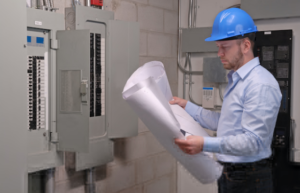The Best Ways to Ensure Your Concrete Is Protected from the Brutal Winter Weather

Read on for some ways you can protect your concrete from the brutal winter weather!
Winter is here, and soon enough, here in the Mid-Atlantic we will be experiencing plenty of snow, hail, and sleet. This means you should be taking the right steps to protect your property’s various concrete surfaces, including walkways, balconies, patios, and other exposed outdoor surfaces. Concrete is entirely porous, and this means that it absorbs water readily. Porous materials are much more easily damaged during the winter freeze-thaw cycles than any non-porous ones. While concrete is a stronger and more durable material, it is not resistant to any other chemicals and other treatments you may apply to keep it ice-free and snow free. Read on for some ways you can protect your concrete from the brutal winter weather!
Seal Your Concrete Surfaces Regularly
A simple way to protect concrete surfaces from brutal winter freezing is by applying sealers on them on a consistent basis. There are two leading types of concrete sealers, and those are film-forming acrylic sealers and penetrating sealers. Acrylic sealers will dry to form a weather-resistant film on top of the concrete, protecting it from water penetration and other deicing chemicals you might use during the winter season. On the other hand, a penetrating sealer won’t create a film on the concrete surface but will instead penetrate deeper down into the concrete pours to help coat the interior with some water-replant substance. These sealers should be directly applied shortly before or after winter has arrived. This will help you avoid any types of dangerous cracks or ground fissures and will help prevent existing cracks from getting worse during the winter seasons!
Limit or Don’t Use Chemical Deicers
Limit the use of chemical deicers around the winter seasons, or don’t use them at all. If you do decide to use them, pick wisely. A few deicing chemicals can damage concrete sealers and the concrete surfaces underneath right away, while others will wither away and harm the surfaces as time passes. Avoid using deicers that contain ammonium nitrate and ammonium sulfate as well. These could hurt concrete by causing it to disintegrate slowly. Ideally, you should be covering slippery concrete with some ordinary sand. Sand will not melt ice, but it will create traction on the ice surface and make it a lot less slippery and safer to walk over.
Remove the Snow Off the Concrete
After an intense snowstorm, you could be tempted to leave a bit of snow on the driveway after you’ve removed enough to drive your car on it. However, remove all the snow from outdoor concrete after each snowfall. If you don’t, the snow might melt once the temperature rises, seep into the concrete’s pores and cracks, and then freeze back into the ice. By taking care of your concrete, you will save yourself a lot of money in the near future, avoiding potential concrete repairs. However, if you do need help with concrete repair services or installations, give the contractors from G&M Services a call today!
Revitalize Your Business with G&M Services
G&M Services is proud of our employees and the dedication they have for safety in the workplace. We reward our employees for displaying positive safety practices. We incorporate weekly and monthly discussions and meetings to ensure that all involved know how to handle equipment and potentially risky situations during a project. We offer services in the way of concrete drilling and sawing, concrete scanning, and Firestop. To get started with us, call today at 410-787-8828 or visit our contact page. Follow the official company page today on Facebook, Twitter, and LinkedIn.








